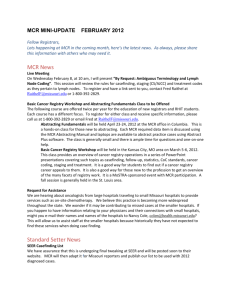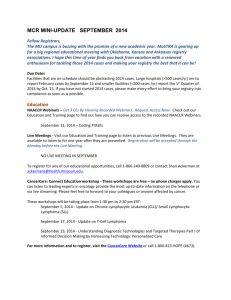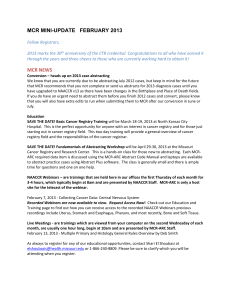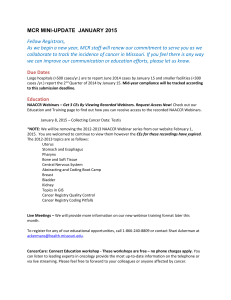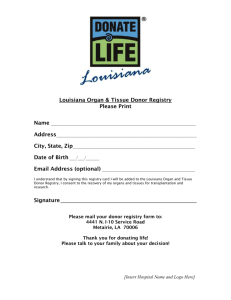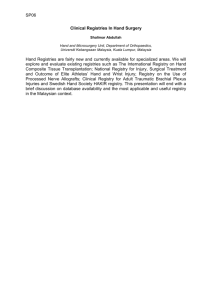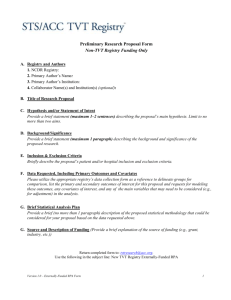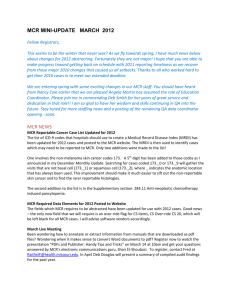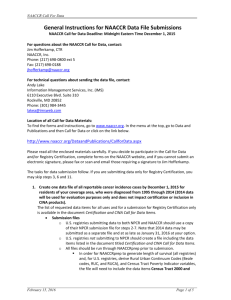Mini-Update - Missouri Cancer Registry and Research Center (MCR
advertisement
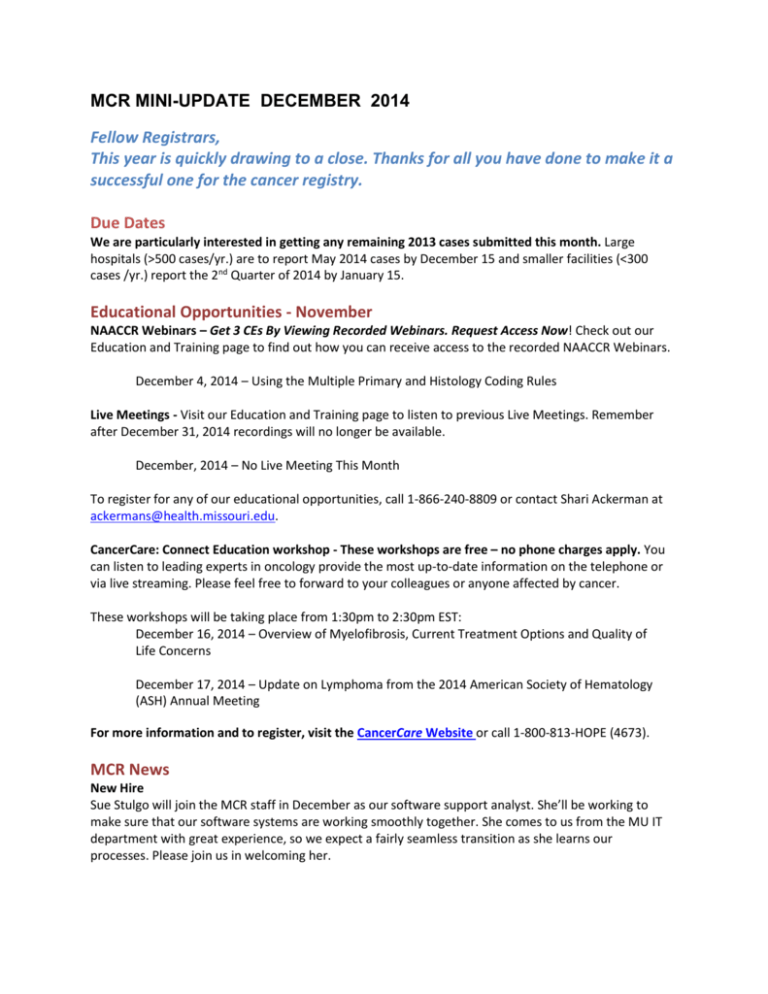
MCR MINI-UPDATE DECEMBER 2014 Fellow Registrars, This year is quickly drawing to a close. Thanks for all you have done to make it a successful one for the cancer registry. Due Dates We are particularly interested in getting any remaining 2013 cases submitted this month. Large hospitals (>500 cases/yr.) are to report May 2014 cases by December 15 and smaller facilities (<300 cases /yr.) report the 2nd Quarter of 2014 by January 15. Educational Opportunities - November NAACCR Webinars – Get 3 CEs By Viewing Recorded Webinars. Request Access Now! Check out our Education and Training page to find out how you can receive access to the recorded NAACCR Webinars. December 4, 2014 – Using the Multiple Primary and Histology Coding Rules Live Meetings - Visit our Education and Training page to listen to previous Live Meetings. Remember after December 31, 2014 recordings will no longer be available. December, 2014 – No Live Meeting This Month To register for any of our educational opportunities, call 1-866-240-8809 or contact Shari Ackerman at ackermans@health.missouri.edu. CancerCare: Connect Education workshop - These workshops are free – no phone charges apply. You can listen to leading experts in oncology provide the most up-to-date information on the telephone or via live streaming. Please feel free to forward to your colleagues or anyone affected by cancer. These workshops will be taking place from 1:30pm to 2:30pm EST: December 16, 2014 – Overview of Myelofibrosis, Current Treatment Options and Quality of Life Concerns December 17, 2014 – Update on Lymphoma from the 2014 American Society of Hematology (ASH) Annual Meeting For more information and to register, visit the CancerCare Website or call 1-800-813-HOPE (4673). MCR News New Hire Sue Stulgo will join the MCR staff in December as our software support analyst. She’ll be working to make sure that our software systems are working smoothly together. She comes to us from the MU IT department with great experience, so we expect a fairly seamless transition as she learns our processes. Please join us in welcoming her. Reminder: Live Meeting Recordings – Final month! Listen now before they are gone! Please take advantage of any sessions you missed by listening to the recordings posted on our website: http://mcr.umh.edu/mcr-livemeeting.php. Unfortunately, in 2015 you will no longer have access to these previous recordings. NAACCR Submission MCR completed our annual data submission to NAACCR just before Thanksgiving. Thank you for the cases you sent us. QA worked hard to get them into our database and Saba helped us to do all the required pre-submission quality checks. We are hopeful that together we will achieve gold certification again – stay tuned! Now we gear up for our submission to NPCR in January! Abstracting Tips DCIS When abstracting breast primaries, for ACoS hospitals you may save time by cutting down on the amount of detail you enter in the Pathology text field. I.e., when both invasive and in situ tumor is present, there is no need to record each subtype of DCIS or to specify grading for the in situ histologies. Instead, cite the presence of in situ tumor in terms that support the code for CS SSF 6. For example, text for code 040 might be stated as, “2 cm DCIS with 1 mm focus of invas.” Reducing the amount of DCIS info in the text is appropriate for non-ACoS hospitals as well because SSF 6 is not required by MCR. Neuroendocrine cancer of the prostate Very rarely a newly diagnosed prostate cancer is found to have neuroendocrine histology (de novo NEPC). More commonly now NEPC is occurring as a result of treatment of advanced prostate cancer with hormone therapy (transformed treatment related or t-NEPC). They typically have very low PSA but an aggressive course, so they are sometimes diagnosed at metastasis as neuroendocrine primaries of unknown origin. This is a very informative article: http://www.pcf.org/site/c.leJRIROrEpH/b.8747629/k.F201/Subtype_of_Highly_Aggressive_Prostate_Ca ncer_Increasing_Tied_to_Drug_Resistance_to_Hormone_Therapy.htm#.VG0G7CnxO9Y.email Additionally, SEER Inquiry Question 2013221 gives some guidance on using the MP/H rules: Question MP/H Rules/Multiple primaries--Prostate: How many primaries are accessioned for a diagnosis of metastatic small cell neuroendocrine carcinoma of the prostate following a previous diagnosis of adenocarcinoma of the prostate? Answer Accession two primaries, adenocarcinoma [8140/3] of the prostate [C619], followed by small cell (neuroendocrine) carcinoma [8041/3] of the prostate [C619] for each of the examples given per Rule M10. In each case, the second histology (because it is not adenocarcinoma) is a new prostate primary. Small cell carcinoma and small cell neuroendocrine carcinoma are not adenocarcinomas. As a result they are not covered by Rule M3 Standard Setter News FORDS 2015 has been published. Find it at: https://www.facs.org/qualityprograms/cancer/ncdb/registrymanuals/cocmanuals/fordsmanual. It contains the Grade rules that went into effect for 2014 (also found in 2014 MCR Abstract Code Manual and discussed in MCR Live Meeting recording from July 2014), clarification regarding biopsies followed by surgery (further discussed in MCR Update November 2014), and new sex codes for 2015 that differentiate transsexual, male to female from female to male. This is a routine annual update of FORDS. They are still taking suggestions through 12/31/14 for the FORDS Revision Project: https://www.facs.org/qualityprograms/cancer/ncdb/registrymanuals/cocmanuals/fordsrevision Registry to Research MCR was well represented with the following presentations and posters at the American Public Health Association annual meeting in New Orleans in November. You can find the abstracts by searching Jackson-Thompson at the conference website: https://apha.confex.com/apha/142am/webprogram/start.html One central cancer registry’s use of National Death Index (NDI) linkage to become a survival registry Using National Death Index linkage to improve data on female breast cancer survival How central cancer registry informatics and information technology (HIIT) systems can benefit other APHA sections Interactive mapping of leukemia in Missouri Interactive mapping with cancer incidence, demographic, and behavioral risk data How an informatics solution increased efficiency and reduced costs in a central cancer registry (CCR) How one central cancer registry (CCR) navigated EHR reporting from Clinic/Physician Offices (C/POs) How Meaningful Use (MU) Stage 3 may impact one central cancer registry’s progress in MU Stage 2 Global surveillance of cancer survival 1995—2009: analysis of individual data for 25 676 887 patients from 279 population-based registries in 67 countries (CONCORD-2) http://www.thelancet.com/journals/lancet/article/PIIS0140-6736%2814%2962038-9/fulltext Comprehensive Cancer Control Plans by state (incl. MO data) http://www.cdc.gov/cancer/ncccp/ccc_plans.htm Cancer Statistics Animator (SEER data) Choose various variables and set the graph to animate changes across time or age groups http://seer.cancer.gov/canstat/ Colorectal cancer increase in young adults (SEER data) http://archsurg.jamanetwork.com/article.aspx?articleid=1920838 No survival benefit of RAI seen in early-stage thyroid cancer (SEER data) http://www.practiceupdate.com/News/6361/2/1/?elsca1=emc_enews_dailydigest&elsca2=email&elsca3=practiceupdate_onc&elsca4=oncology&elsca5=newsletter&rid=NTU2MjE4 MTE1NjYS1&lid=10332481 Use of and mortality after bilateral mastectomy compared with other surgical treatments (California central registry data analysis) http://jama.jamanetwork.com/article.aspx?articleid=1900512 Differing patterns of treatment for differentiated thyroid patients younger v older than 45 (California central registry data analysis) http://www.practiceupdate.com/News/6297/32/1/?elsca1=emc_conf_ATA2014Roundup&elsca2=email &elsca3=practiceupdate_onc&elsca4=2014101_ATA2014Roundup&elsca5=conference&rid=NTU2MjE4 MTE1NjYS1&lid=10332481 Resources Small breast cancers how and when to treat http://www.sciencedirect.com/science/article/pii/S0305737214001649 Cervical cancer is preventable (statistics and infographic) http://www.cdc.gov/vitalsigns/cervical-cancer/ Molecular testing guidelines for lung cancer (EGFR, ALK, etc) http://jco.ascopubs.org/content/32/32/3673 Prognostic model for survival after debulking surgery for epithelial ovarian cancer http://www.gynecologiconcology-online.net/article/S0090-8258(14)01222-0/abstract Partnering with China to understand cancer epidemiology and cancer control differences http://dceg.cancer.gov/news-events/linkage-newsletter/2014-11/research-publications/chinapartnership Dogs can detect thyroid cancer from urine samples. http://www.practiceupdate.com/News/6256/2/1/?elsca1=emc_enews_dailydigest&elsca2=email&elsca3=practiceupdate_onc&elsca4=oncology&elsca5=newsletter&rid=NTU2MjE4 MTE1NjYS1&lid=10332481 Thanks for the work you do every day! Nancy H. Rold, CTR Operations Manager Missouri Cancer Registry and Research Center
